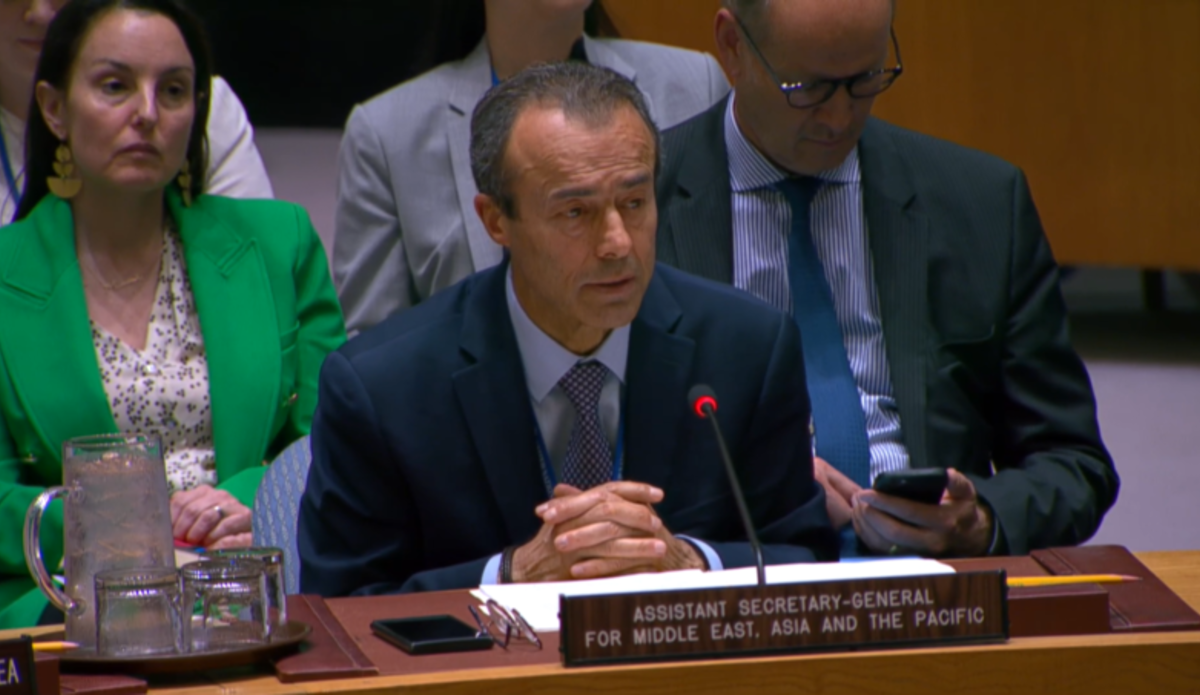Remarks by Mr. Khaled Khiari, Assistant Secretary-General,
Departments of Political and Peacebuilding Affairs and Peace Operations
REMARKS TO THE SECURITY COUNCIL ON NON-PROLIFERATION/DPRK
New York, 7 May 2025
Mr. President,
Members of the Security Council,
I have been requested to brief the Security Council today on non-proliferation/Democratic People’s Republic of Korea (DPRK).
This year marks the final year of the DPRK’s five-year military development plan (2021-2025). Throughout 2024 and early 2025, the DPRK has continued to conduct launches of ballistic missiles, including what it characterized as the “Hwasong-19” intercontinental ballistic missile (ICBM) in October last year, and an intermediate-range hypersonic ballistic missile (IRBM) in January this year.
According to the International Atomic Energy Agency (IAEA), the DPRK has continued its open displays of undeclared uranium enrichment facilities located in Yongbyon and Kangson. These events have been accompanied by statements reiterating the DPRK’s intention to further develop nuclear and ballistic missile capabilities, including tactical nuclear warheads, military reconnaissance satellites, and the construction of a “nuclear-powered strategic missile submarine”.
Mr. President,
The DPRK’s persistent pursuit of nuclear weapons and ballistic missile programmes, in violation of relevant Security Council resolutions, continues to undermine the global nuclear disarmament and non-proliferation regime, and the Treaty on the Non-Proliferation of Nuclear Weapons (NPT) that underpins it. At this critical juncture, it remains as important as ever to continue to highlight the urgent need to reduce nuclear risk, prevent any use of a nuclear weapon and bring about their total elimination. We continue our strong calls on the DPRK to fully comply with its international obligations, including the NPT and IAEA safeguards, and to sign and ratify the Comprehensive Nuclear-Test-Ban Treaty.
The Panel of Experts, established pursuant to Security Council resolution 1874 (2009), supported efforts to monitor the implementation of the resolutions established in response to the DPRK’s nuclear weapons and ballistic missile programmes.
From 12 June 2009 until 30 April 2024, the Panel gathered and analyzed information from Member States, relevant United Nations bodies and other interested parties regarding the implementation and non-compliance of the relevant resolutions and made recommendations. The Panel of Experts issued two reports annually, and its last report was released on 20 March 2024, well over one year ago.
While the Security Council did not renew the mandate of the Panel of Experts beyond 30 April 2024, the Security Council Committee established pursuant to resolution 1718 (2006) continues to oversee the sanctions regime. We recall the obligations for all Member States to implement the relevant sanctions measures. As the Secretary-General has stated, any relationship that a country has with the DPRK must entirely abide by the relevant Security Council sanctions.
Mr. President,
The broader security landscape on the Korean Peninsula remains tense, with heightened military activities, limited avenues for inter-Korean and regional dialogue, the presence of nuclear risks and growing concerns over the potential for miscalculation. The Secretary-General has consistently underscored that sustainable peace and the complete and verifiable denuclearization of the Korean Peninsula must be anchored in dialogue and diplomacy. We welcome any efforts in this respect.
Mr. President,
Separately, the Council must also remain attentive to the humanitarian situation in the DPRK. We reiterate the call on the DPRK to facilitate the return of the UN Country Team to strengthen support for its people and advance the 2030 Agenda.
Thank you.

